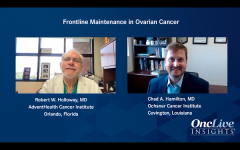
The Future of Ovarian Cancer Treatment
Oncologists contemplate what ovarian cancer treatment will look like in the future and exciting clinical trials in progress.
Episodes in this series

Chad A. Hamilton, MD: For the last few minutes, I want you to look into your crystal ball. I know you’re doing a lot of clinical trials. What type of things on the horizon are you most excited about in ovarian cancer?
Robert W. Holloway, MD: I think it’s obvious to all of us that the topic of immunotherapy is front and center in most clinical trials, introducing it into all of our solid tumor treatment. I think over the next decade, we’re going to see frontline immunotherapy introduced into ovarian cancer as well, whether it’s in the maintenance setting or with chemotherapy. It doesn’t just have to be checkpoint inhibitors; we have vaccine trials that are being conducted now to sensitize, or to make the ovarian cancer cells more immunogenic. We have a frontline intraperitoneal GEN-1 construct trial that we’re doing here with getting interferon on the cell surface to attract white cells. FLORA-5 is a GOG [Gynecologic Oncology Group] partners trial that’s going on around the country with oregovomab, which is an antibody construct that goes from the cell surface, CA-125 [cancer antigen 125], to make it more immunogenic. It’s a phase 3 trial; the phase 2 was very positive, as you know. We’ve been working with oncolytic virus to reverse platinum sensitivity and make cells more immunogenic here. I think we’re about to hopefully present a phase 3 trial to GOG partners.
I’m a very big enthusiast, and if you’ve seen what’s going on in lung cancer, you know, for certain lung cancers, pembrolizumab is now frontline therapy with carboplatin-based therapies. I wonder if we’re not going to select out the relative minority of patients who are PDO [patient-derived organoid] positive or have tumor infiltrating lymphocytes—whatever the marker is going to be—and add pembrolizumab with our frontline therapy or some other checkpoint. Or, are we going to find a way to manipulate the immune microenvironment for our patients and add checkpoint inhibitors? I think that’s where we’re going.
Chad A. Hamilton, MD: Well, you have been on the forefront of clinical trials for many years now, and I’m a huge proponent. I think that’s our gateway to all of these advances that we see. I take every opportunity to make a pitch to folks to continue to look for clinical trial opportunities for enrollment. This is how we got to where we are with maintenance therapy, and it’s how we find tomorrow’s best treatment.
Robert W. Holloway, MD: Absolutely.
Chad A. Hamilton, MD: I appreciate your time. We’ve had a great conversation today. I look forward to talking to you about the advances that we see in the next few months.
Robert W. Holloway, MD: It’s been great. I really appreciate the conversation and the opportunity. Thank you.
Transcript edited for clarity.







































